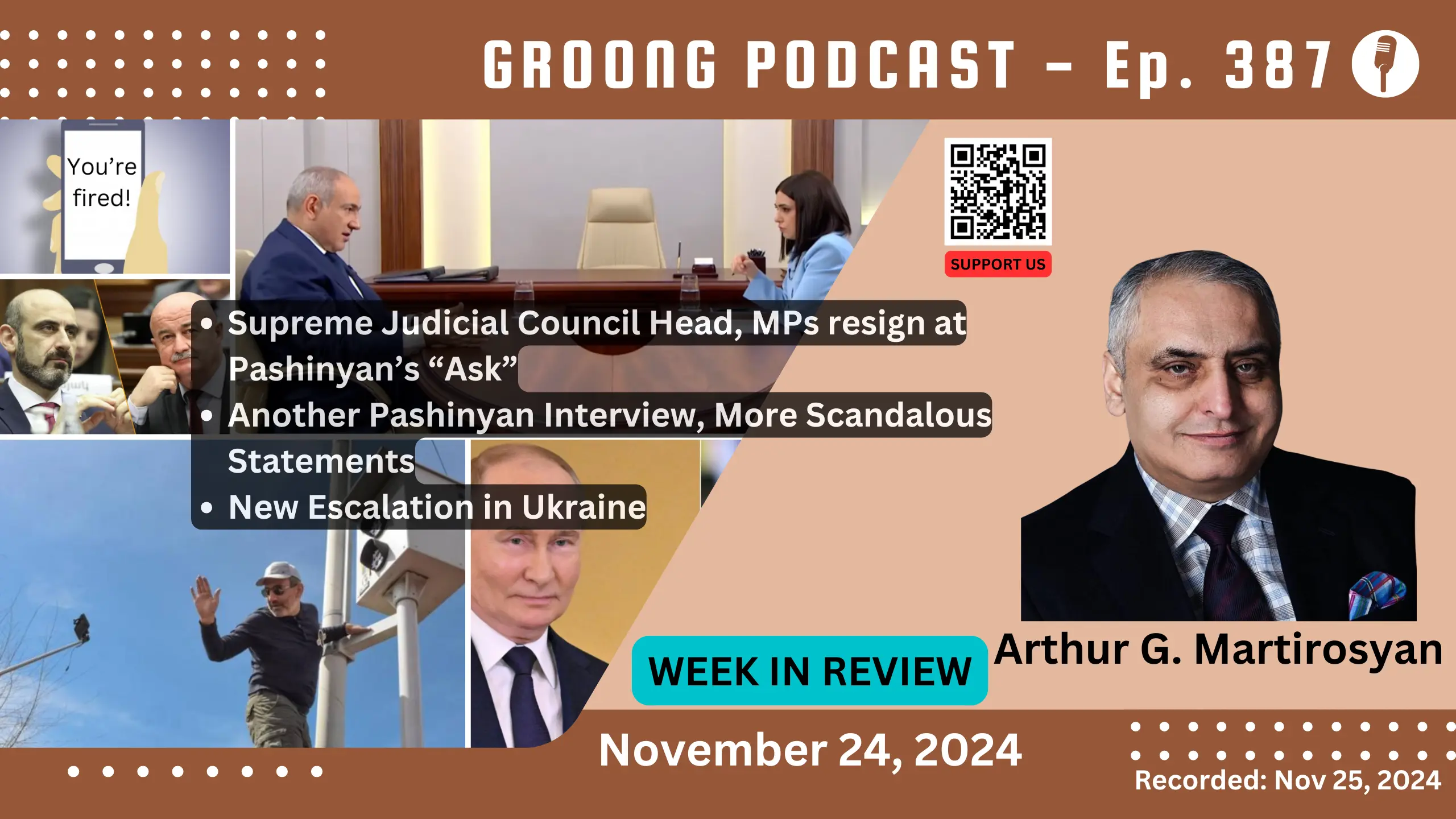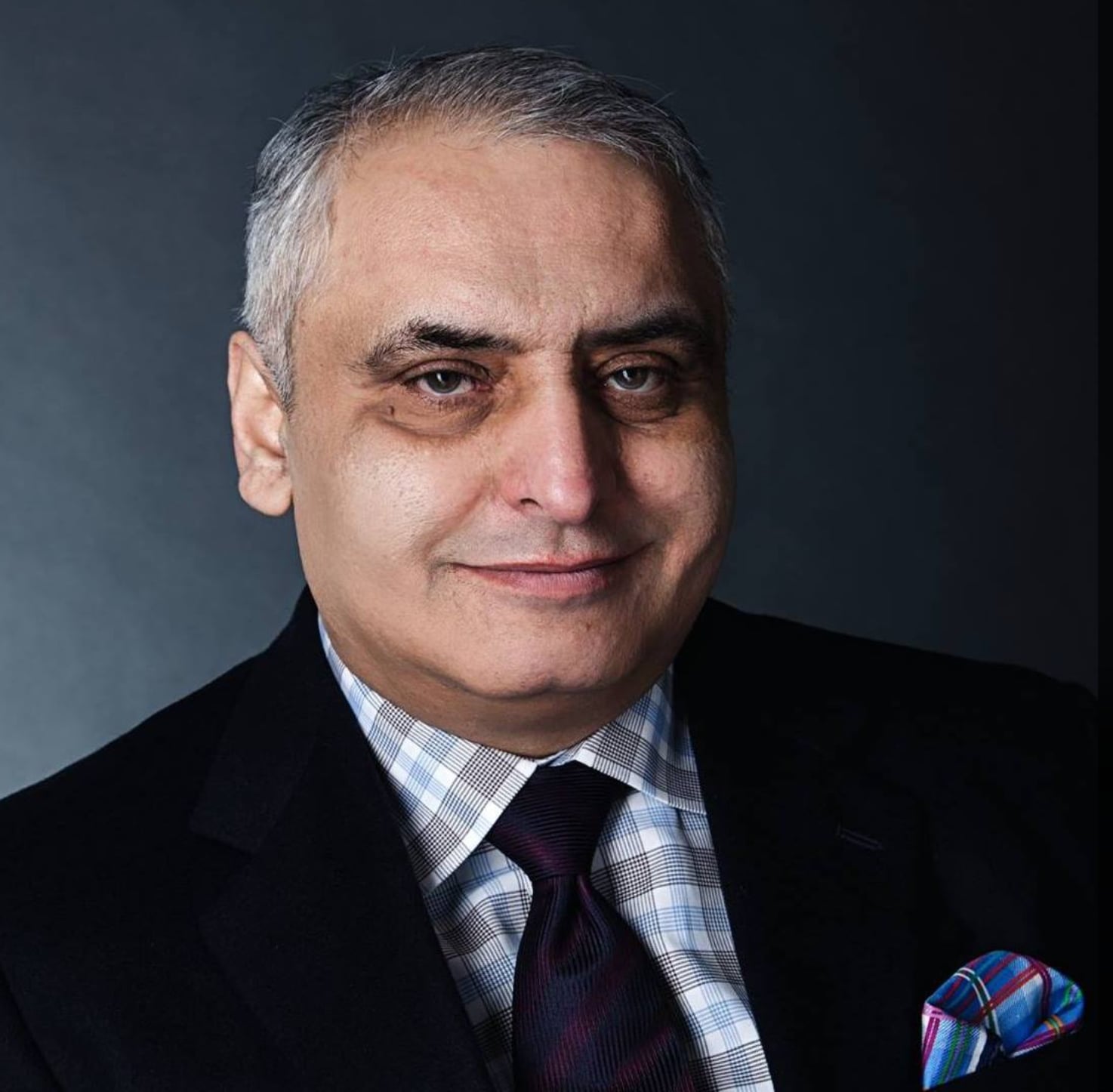
Groong Links:
Guest:
Topics:
- Supreme Judicial Council Head, MPs resign at Pashinyan’s “Ask”
- Another Pashinyan Interview, More Scandalous Statements
- Speed Cameras, Government Officials Cars
- “Western Azerbaijan” ≠ “Western Armenia”
- EU Mission in Armenia
- New Escalation in Ukraine
Episode 387 | Recorded: November 25, 2024
Show Notes
November 25 is Monte Melkonyan’s birthday. An Armenian National Hero who embodied unwavering courage, intellect, and a selfless dedication to the liberation of Artsakh, inspiring generations with his vision of a free and secure homeland. Despite our dark days, his legacy inspires us, proving that heroes like Monte come from the strength of our people.
Supreme Judicial Council Head, MPs resign at Pashinyan’s “Ask”
We all know about the spate of resignations of many of Pashinyan’s cabinet ministers, members of parliament and the head of the supreme judicial council. In fact, we covered it last week and frankly we weren’t planning to talk about it anymore.
We actually laughed off initial reports that he committed this Sunday firing spree through text messages, thinking this to be too ridiculous to be true. Well, we were wrong! He actually admitted that he “asked” all these people to resign by text.
Look, senior members of the cabinet are members of the government and Pashinyan can fire them at will. But members of parliament are elected officials. A member of the Supreme Judicial Council is voted on by the parliament, and judges, and is supposed to be independent of the executive branch.
Yet, all of these members of the legislature and a member of the judicial branch resigned at the “asking” of the head of the executive branch.
Question:
- How can a prime minister “request” other constitutional actors who are not appointed by him to resign and how can they so easily comply?
- What does this indicate about the state of Armenia’s democracy?
Another Pashinyan Interview, More Scandalous Statements
Pashinyan gave another interview to Armenian Public TV last week and as with so many of his recent appearances, his statements aroused a great deal of controversy, if not outright anger. We should preface this by noting that Armenian Public TV is wholly funded by the Armenian government and is not an independent news outlet.
So, as is the norm, Pashinyan chose a very friendly medium for the interview. In our opinion, all of the questions being posed had prior approval from Pashinyan, or more likely, I’d say the questions or topics were probably provided by Pashinyan’s PR team, and so the interview was more like a spoken FAQ for explanations that Pashinyan wanted to repeat again and again for the public. So we approach the interview with that in mind.
Speed Cameras, Dedicated Cars
Pashinyan brought into the public agenda two clearly populistic issues:
- The interviewer out of the blue brought up the question of speed cameras. During the so-called “velvet revolution” Pashinyan and his co-revolutionaries had used the issue of the widely disliked speed cameras to his favor by blocking them with stickers or even feminine undergarments, and he had promised to get rid of them. Yet after coming to power he changed his mind. But in this interview, Pashinyan suddenly said that he would support a constitutional referendum to remove the speed cameras.
- Pashinyan also said that he would take the axe to dedicated cars for public officials. He had used this popular issue in 2018, claiming that too many government officials have their own cars, but again after coming to power the number of cars and the price of such cars, including for him and his wife, has only increased.
Questions:
- Why would Pashinyan bring up populistic topics like the speed cameras and cars for public officials right now?
- Why would he associate repealing these traffic laws, or simple government policy matters with a constitutional referendum? Is he trying to sugar-coat a referendum which otherwise will be laden with Azerbaijani demands?
- Pashinyan has had 6 years to deal with these comparatively simple issues, and he has not done so. Is he using these to lay the ground for the next elections, whether snap or early elections, or the scheduled June 2026 elections?
“Western Azerbaijan” ≠ “Western Armenia”
Let’s discuss a few of the other major topics from Pashinyan:
On the topic of Azerbaijan’s expansionist policy of claiming Armenia to be Azerbaijani territory and using the term “Western Azerbaijan” for Armenia, Pashinyan rationalized this by saying that Armenians frequently use the term “Western Armenia”.
Questions:
- Is the usage of the term “Western Armenia” and the use of the term “Western Azerbaijan” by Azerbaijani government officials the same?
- Do you think this term comes from Turkish sources, in order to abate Armenian claims to historic Armenian lands?
Constitutional Demands
On the topic of Azerbaijan’s demands for Armenia to change its constitution, Pashinyan said that Azerbaijan too has territorial demands in its constitution, but Armenia is not raising those issues with Azerbaijan in order to not derail the peace process.
Questions:
- As an expert in negotiations, what is your take on Pashinyan claiming that Azerbaijan’s constitution makes territorial claims against Armenia, and then not raising those issues for the sake of not blocking the negotiations?
EU Mission in Armenia
On the issue of Azerbaijan demanding that the EU monitors be removed from Armenia, Pashinyan confirmed that he’s ready to do so at least on the portions of the border which have been delimited and demarcated.
Questions:
- Is it rational for Pashinyan to exclude the EU Monitoring Mission out of the segments that have been allegedly defined, especially since the agreed upon principles assert that the border definitions may simply be superseded by the so-called “peace treaty”?
- Many analysts had predicted that the EU monitoring mission presence in Armenia is a foothold for long term EU or Western presence in the region. What are the interests of the EU in this scenario where Pashinyan seems to be OK with not having any monitors so long as the borders are delimited and demarcated?
Further Escalation in Ukraine
The outcome of the war in Ukraine is crucial to Armenia and its region.
Last week, in a move that was apparently previously planned to happen after the US elections, the Biden administration authorized Ukraine to use long range US weapons to strike targets inside the territory of Russia itself. Immediately after news of this authorization, Ukraine fired ATACMS missiles at Russian targets in Kursk.
Russia responded swiftly, firing a completely new weapon in the Russian arsenal, called Oreshnik, at Ukrainian targets in Dnepr. At the same time, Russia updated its nuclear doctrine, lowering the threshold for nuclear weapons use, allowing for a nuclear response to conventional attacks that pose critical threats to the sovereignty or territorial integrity of Russia or its allies, including Belarus.
Trump has signaled intentions to halt the conflict in Ukraine (albeit without providing any details) and Trump allies, including his own son, Donald Trump Jr., have criticized the Biden Administration’s authorization, claiming that Biden is trying to instigate “World War 3”.
Questions:
- Could this move be an attempt by the outgoing Biden administration to lock-in an escalatory course in relations between the West and Russia, before Trump takes office?
- Would Trump be able to change US policy on the war in Ukraine?
- What about China, can the US split China from Russia?
Thoughts from the Participants
- Hovik: Jeffrey Sachs in Armenia: “Don’t rely on the US.”
- Arthur: How will Georgia, Russia & Abkhazia play out, and Armenia is not paying enough attention.
Wrap-up
That’s our Week in Review, we hope you found it helpful. We invite your feedback and your suggestions, you can find us on most social media and podcast platforms.
Thanks to Laura Osborn for the music on our podcasts.
Guests

Arthur G. Martirosyan
Arthur G. Martirosyan is a Senior Consultant with CM Partners. In 1994, after graduating from Yale University, he joined Conflict Management Group and Harvard Negotiation Project, and has since worked on conflicts in the former Soviet Union, the Middle East, the Balkans, Africa, and Latin America.
Hosts

Hovik Manucharyan
Hovik Manucharyan is an information security engineer who moved from Seattle to Armenia in 2022. He co-founded the ANN/Groong podcast in 2020 and has been a contributor to Groong News since the late 1990s.
Disclaimer: The views expressed by Hovik Manucharyan on the ANN/Groong podcast are his own and do not necessarily reflect the opinions of his employer or any other organization.

Asbed Bedrossian
Asbed Bedrossian is an IT professional, and for years oversaw the central IT enterprise infrastructure and services at USC. His decades of experience spanned across IT strategy, enterprise architecture, infrastructure, cybersecurity, enterprise applications, data center operations, high performance computing, ITSM, ITPM, and more.
Asbed founded the Armenian News Network Groong circa 1989/1990, and co-founded the ANN/Groong podcast in 2020.